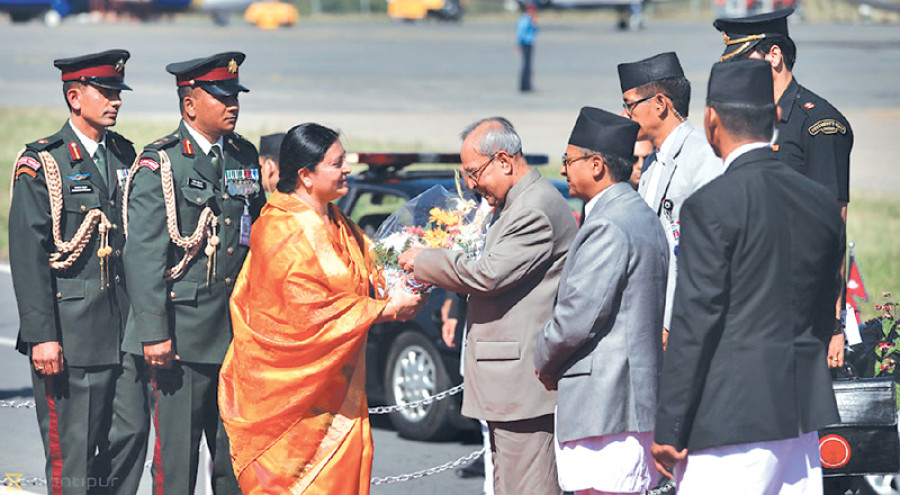Opinion
Mukherjee’s visit
New Delhi should refrain from micro-managing Nepal, even if selfish Nepali leaders give the green light to do so
Jainendra Jeevan
Indian President Pranab Mukherjee paid a three-day state visit to Nepal between November 2 and 4. The host nation offered him a grand welcome. As a sign of respect, the Nepal government even declared the day of his arrival a public holiday, which drew plenty of public criticism.
For security reasons, the sites Mukherjee visited and the roads to and from those sites were closed for the general public, which further annoyed the people.
False alarm
Though Nepali authorities too did not want to take chances, the extraordinary security arrangements were made at the behest and assistance of the Indian authorities. In view of the public anger against India since last year, they seem to have anticipated protests against, if not assault upon, the Indian President on Nepali soil. Yes, we may have some people and politicians who are pathologically anti-Indian—for which Indian policy too is not without blame—but they have no link with cross-border anti-India political or terrorist outfits. And they are not well organised, numerically strong and technologically capable to cause physical harm to visiting dignitaries on their own. All they might have done, if they were free to do so, was perform some symbolic acts of protest, such as waving black flags or carrying placards from some distance.
When Indian Prime Minister Narendra Modi paid a state visit to this country in 2014, security arrangements were not as tight as they were this time around, although the powerful executive chief would have been a more tempting target for extremist outfits than Mukherjee, the titular head of the Indian state. During one of his visits, Modi even casually stepped out of his car to meet and talk with pedestrians, who were pleasantly surprised. With many such public relation exercises, Modi won the hearts and minds of Nepali people. Sensing Nepali people’s mood, even the extreme anti-India groups did not dare launch any protest rally during his visit.
However, India’s four-and-half-month-long blockade following its unsuccessful meddling in Nepal’s constitution-making process last year fuelled a feeling of hatred among Nepali people towards India. Even ordinary people, who were otherwise friendly towards India, became angry towards their closest neighbour. Though the memories of the painful blockade will vanish after some time, people’s apprehension may not evaporate soon as India continues, overtly or covertly, to back the Madhesi agitation. The agitation for regional autonomy and federalism has also nurtured, knowingly or unknowingly, a tendency towards self-alienation and segregation in the Tarai.
Mending ways?
If Mukherjee’s repeated suggestions to “soon amend the constitution to accommodate the disgruntled (Madhes-centric) parties” are anything to go by, New Delhi has not changed its reservations about our constitution in substance, although the words sound more polished now. It has clearly not altered its policy of preferential treatment towards the Madhesis vis-à-vis other communities of Nepal either. But as an aspiring global power and an established regional power, India wants to maintain friendly relations with Nepal. Mukherjee’s ‘goodwill mission’, 18 years after any Indian President paid a visit to this country, certainly reflected this desire, although it is unclear if it also reflected a realisation of its high-handedness in the past. Nepal too wanted to improve its relations with India, so it extended majestic hospitality to Mukherjee. The landlocked nation that depends on India for, among other things, passage to the international waters, will always remain its closest ally and neighbour. The oneness of their geography and culture has dictated Nepal to be so. Rulers and politicians on both sides of the border cannot change this reality.
Understanding each other’s sensitivities
Barring some extremists, the overwhelming majority of Nepalis are sensible people who know their limitations. They have no ill feelings towards India, and have no desire whatsoever to antagonise, let alone harm it. Whoever among Indian politicians, policy makers, security personnel or bureaucrats believes otherwise is grossly mistaken, misinformed or misguided. All Nepali people want is to exercise their sovereignty and national independence, which should be of no problem for free and democratic India.
Indian politicians, bureaucrats, and civil society groups that include their jingoistic media should give up worrying about ‘Nepal’s China card’. They must realise and appreciate that Nepal’s friendly relations with China does not come in the way of Nepal-India relations. Nepal-India relations is unique and will remain so with or without China. It is time for our Indian friends to ponder why there is no ‘anti-China’ psyche in Nepal. It is simply because China does not meddle in Nepal’s internal affairs. New Delhi can take a lesson from China.
Nepali people have not forgotten the help they received from India, both in our democratisation process and economic development. However, this does not mean that Nepal should remain dependent on India. Nepal might have been dependent on it on several fronts, but it has always been a sovereign nation. Gone are the days of notions such as ‘dependent state’, ‘influence zone’, ‘buffer state’, ‘security umbrella’, ‘Himalaya—India’s northern frontier’ and so on. It is high time policy makers on both sides reassessed Nepal-India ties accordingly. When Bhutan, once an Indian protectorate, could not be stopped from asserting its sovereign rights, how can one expect a free Nepal to be subservient?
Therefore, India should stop intervening in Nepal’s internal affairs once and for all. New Delhi should stop dictating how Nepal writes and implements its constitution. It should also refrain from trying to micro-manage Nepal, even if weak and selfish Nepali leaders give them the green light to do so. All such acts will only inflame anti-India feelings among the Nepali people. A more independent, self-assertive and strong Nepal will also be more capable to address India’s legitimate security concerns and business interests. And New Delhi will no longer have to worry excessively about the security and public esteem of any Indian dignitary visiting Nepal.




 9.6°C Kathmandu
9.6°C Kathmandu










